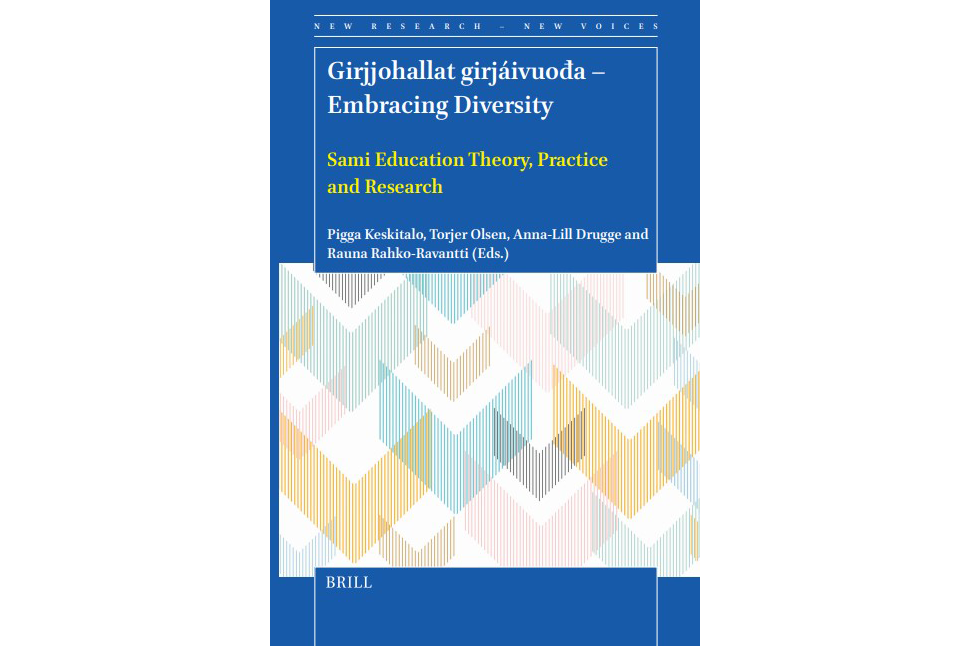Girjjohallat girjáivuođa – Embracing Diversity, Sami Education Theory, Practice and Research provides an overview of Nordic research on Sámi pedagogy, Sámi language education and Sámi language teaching. It also presents the situation of the Maori in New Zealand and highlights directions for the development of Indigenous education and research.
Sámi pedagogy and education have two objectives. The first is to improve the learning conditions of Sámi children and young people as well as to revitalize and maintain Sámi languages and culture. The second objective is to provide information on Sámi for all as part of general education.
Teachers and teacher trainers play a key role in achieving both objectives. Therefore, the Nordic teacher educators and scholars mapped the current state of Sámi education and research as well as development and research needs in Sámi and Indigenous pedagogy. Scholars from the University of Lapland, Umeå University, UiT the Artic University of Norway, the Sámi University of Applied Sciences, Nord University, and the Sámi Archives participated in the work.
Girjjohallat girjáivuođa - Embracing Diversity: Saami Education Theory, Practice and Research provides an overview of Nordic research on Sámi pedagogy, Sámi language education and Sámi language teaching.
– The book emphasizes that education is a dynamic force with profound effects on individuals and communities. In addition to understanding the big picture is important to increase understanding of endangered languages and the importance of Indigenous traditional knowledge, says Professor of Education
Pigga Keskitalo from the University of Lapland.
Tuija Turunen, Professor of Education at the University of Lapland, says that Sámi and Indigenous issues should be more thoroughly integrated into teacher training curricula.
– Mainstream education should function ecologically by incorporating Indigenous knowledge and pedagogical solutions. Sustainable development and climate change, for instance, in educational contexts, are issues that might benefit from Indigenous peoples’ traditional knowledge, she says.
Looking to the Future, Recognizing the Past
The project comprised three workshops. The workshops were designed according to Rauna Rahko-Ravantti's ´tepee model´ healing circle framework. It includes mapping of existing problems, an analysis of the current situation, and a presentation of future development objectives. The framework-based workshops clarified the impacts of Sami education’s history of assimilation, colonization and language and cultural loss, and also summarized the present educational research, policy making and practices.
The first part of the book reviews the theoretical background and presents philosophical, historical and methodological perspectives. The authors discuss the current state of Sámi education, concepts, research activities and research ethics. In addition, Indigenous education in the global context is examined.
The second part of the volume presents different aspects of Sámi education in four countries inhabited by Sámi: Finland, Sweden, Norway, and Russia. It also examines the different educational practices and development needs.
In the third part, the authors present current research topics and the latest research findings.

Information about the publication
The book is an outcome of the Indigenous Pedagogy in Teacher Education (IPED) project 2020–2022. It was funded by the Joint Committee for Nordic Research Councils in the Humanities and Social Sciences (NOS-HS), managed by the Finnish Academy. The project was led by Professor Tuija Turunen. Professor Pigga Keskitalo was a main editor of the IPED book publication process in the project.
Pigga Keskitalo, Torjer Andreas Olsen, Anna-Lill Drugge, and Rauna Rahko-Ravantti (eds.):
Girjjohallat girjáivuođa - Embracing Diversity (2025). Sami Education Theory, Practice and Research Series: New Research - New Voices, Vol. 12. ISBN: 978-90-04-71482-3, ISBN: 978-90-04-71484-7 (e-book).
Permanent link:
https://brill.com/display/title/62941
Further information
Tuija Turunen
tuija.turunen(at)ulapland.fi
+358 40 484 4124
Pigga Keskitalo
pigga.keskitalo(at)ulapland.fi
+358 40 484 4153